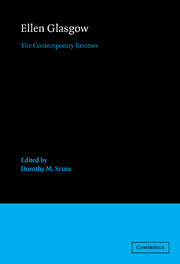Book contents
- Frontmatter
- Contents
- Series Editor's Preface
- Preface
- Acknowledgments
- Introduction
- The Descendant (1897)
- Phases of an Inferior Planet (1898)
- The Voice of the People (1900)
- The Battle-Ground (1902)
- The Freeman and Other Poems (1902)
- The Deliverance (1904)
- The Wheel of Life (1906)
- The Ancient Law (1908)
- The Romance of a Plain Man (1909)
- The Miller of Old Church (1911)
- Virginia (1913)
- Life and Gabriella (1916)
- The Builders (1919)
- One Man in His Time (1922)
- The Shadowy Third and Other Stories (1923)
- Barren Ground (1925)
- The Romantic Comedians (1926)
- They Stooped to Folly (1929)
- The Sheltered Life (1932)
- The Old Dominion Edition of the Works of Ellen Glasgow (1929-33)
- Vein of Iron (1935)
- The Virginia Edition of the Works of Ellen Glasgow (1938)
- In This Our Life (1941)
- A Certain Measure (1943)
- Index
In This Our Life (1941)
Published online by Cambridge University Press: 04 May 2010
- Frontmatter
- Contents
- Series Editor's Preface
- Preface
- Acknowledgments
- Introduction
- The Descendant (1897)
- Phases of an Inferior Planet (1898)
- The Voice of the People (1900)
- The Battle-Ground (1902)
- The Freeman and Other Poems (1902)
- The Deliverance (1904)
- The Wheel of Life (1906)
- The Ancient Law (1908)
- The Romance of a Plain Man (1909)
- The Miller of Old Church (1911)
- Virginia (1913)
- Life and Gabriella (1916)
- The Builders (1919)
- One Man in His Time (1922)
- The Shadowy Third and Other Stories (1923)
- Barren Ground (1925)
- The Romantic Comedians (1926)
- They Stooped to Folly (1929)
- The Sheltered Life (1932)
- The Old Dominion Edition of the Works of Ellen Glasgow (1929-33)
- Vein of Iron (1935)
- The Virginia Edition of the Works of Ellen Glasgow (1938)
- In This Our Life (1941)
- A Certain Measure (1943)
- Index
Summary
Sterling North, “Freedom in Our Time,” Chicago Daily News, 26 March 1941, p. 19
Ellen Glasgow begins to date. She still writes distinguished prose. She continues to depict believable characters. She can fashion a story with remarkable craftsmanship.
But the fact remains that her concepts are still in the artistic cul-de-sac which stopped so many of the famous writers of the 1920's. Even when her characters have a “vein of iron” they are dangerously immature emotionally. But when, as in this novel, all but one have a vein of weakness and moral corruption, it becomes startlingly clear that Ellen Glasgow writes consistently of individuals who, male or female, married or unmarried, rich or poor, strong or weak, rakes or ascetics—are actually frustrated virgins.
These are hard words concerning the work of a distinguished writer. But they have the virtue of stating simply the flaw to be found in too many novels.
Obviously the continuous search for “freedom,” which seems to be the motivation of every character in this book (like the “room-of-one's-own” motif which ran through so many novels in the 1920's) is the inability to adjust oneself to wife, husband or family. Sex, when mentioned, is in terms of romantic conquest, the “destructive” impulse, light flirtation, or something slightly ugly. Otherwise emotional energy is spent in acquiring a “vein of iron” or, as in this novel, selfish and trivial gratifications.
- Type
- Chapter
- Information
- Ellen GlasgowThe Contemporary Reviews, pp. 411 - 442Publisher: Cambridge University PressPrint publication year: 1992



